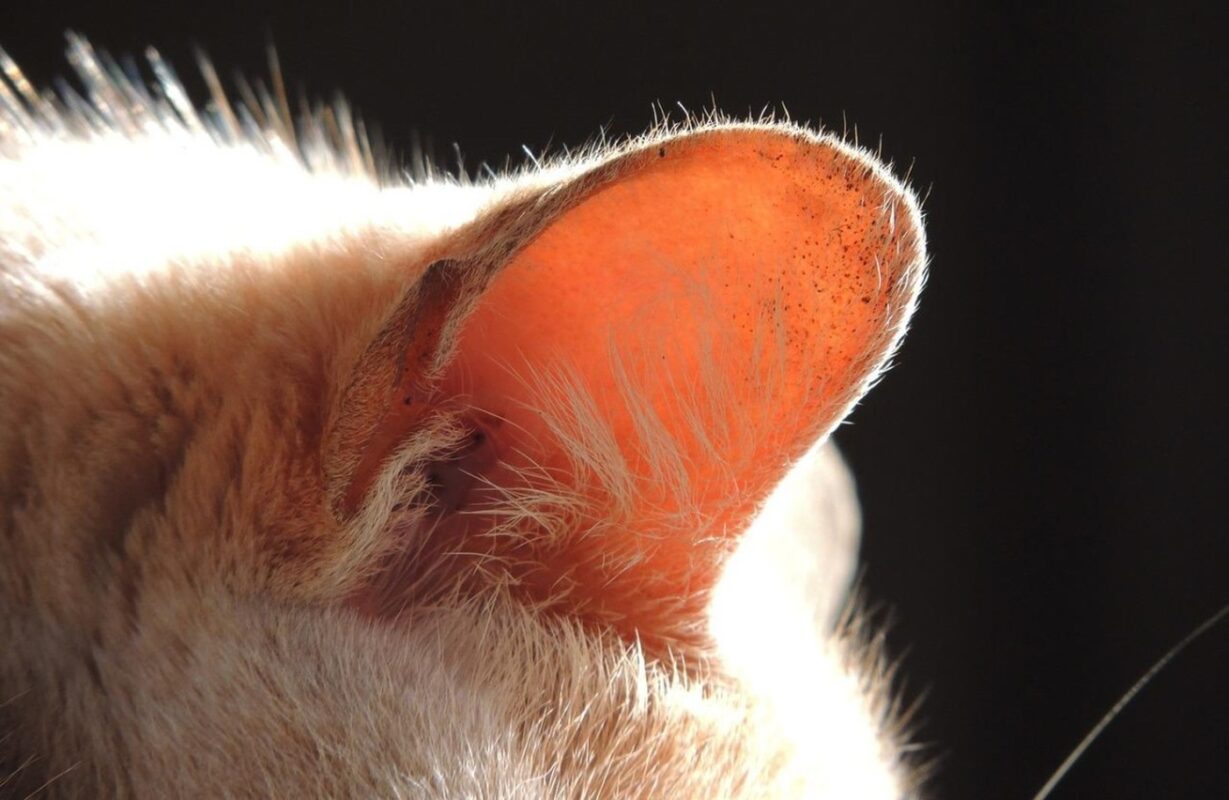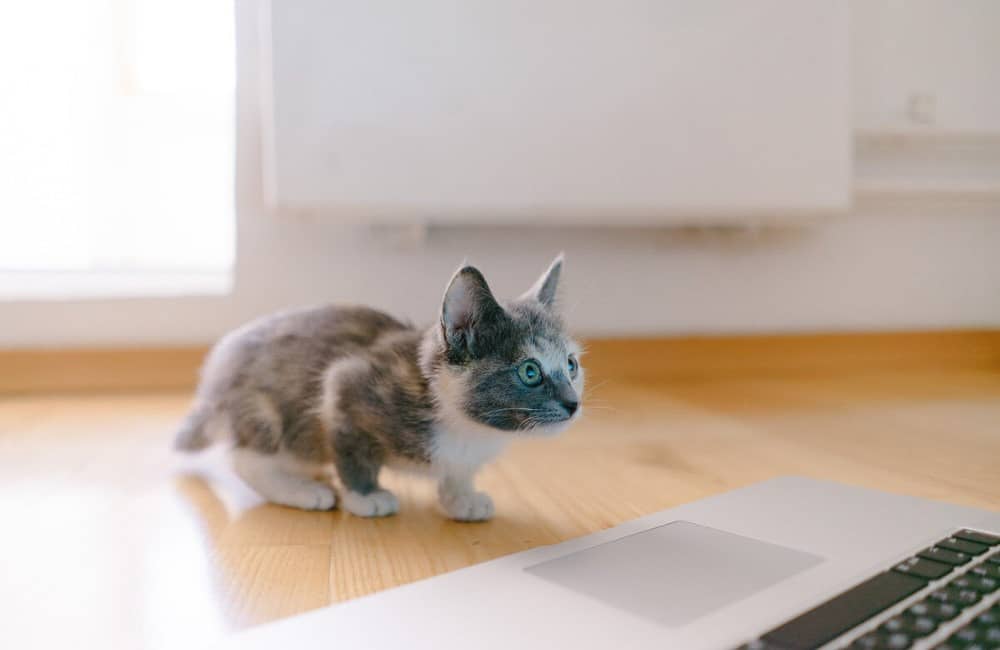Have you seen a viral video that’s been going around of a cat gagging when its owner runs their nails over a comb? Or, have you ever noticed your kitty companion reacting strangely to certain sounds?
This type of cat behavior might have you scratching your head, but it turns out there’s a perfectly good explanation for it.
Let’s explore the question “why do cats gag at combs?” and examine other noises your feline friends might not appreciate. Then we’ll look at the noises your cat does enjoy hearing, so you can create a pleasing auditory environment your cat will surely appreciate.

Image from Tranmautritam on Pexels
Contents
Why do Cats Gag at Combs? Cat Hearing
The reason a cat gags at a comb most likely has to do with their sensitive hearing. Cats are natural predators. They prey on small creatures, like mice and rats. These rodents use ultrasonic sounds to communicate. For this reason, cats are very sensitive to high-pitched sounds; it helps them locate their prey.
Humans and cats share the same lower hearing limit, which is about 20 Hz. However, a cat’s upper limits of hearing go far beyond what a human can hear.
A cat can pick up sounds up to 64,000 Hz, whereas a human can only hear frequencies up to 20,000 Hz. That means a cat can hear three times better than a human can.
Cats can also hear better than dogs, which explains why your pup probably won’t have a reaction to the noise a comb makes when you stroke it with your fingers.

Is a Cat Gagging at a Comb Harmless?
Although it might seem like an innocent joke to play on your cat, it’s important to note that you shouldn’t repeat the comb trick to yield this reaction out of your cat.
Think about it this way; would you enjoy it if someone did something that caused you to gag? Probably not. So although it might seem funny at the time, your furry friend probably doesn’t appreciate it.
Also, their gagging reflex may trigger them to throw up, which is never a good thing.

Feline Audiogenic Reflex Seizures
Certain sounds can trigger cats (especially older cats) to have seizures or become aggressive.
Feline audiogenic reflex seizures (FARS), also referred to as Tom and Jerry syndrome, is a type of cat epilepsy.
It’s caused by an extreme response to noises with high frequencies. This is most common in older cats and the Birmans cat breed. Here are some other common triggers for FARS that you should be aware of.
- Crinkling tin foil
- A metal spoon clinking in a cat’s ceramic feeding bowl
- Chinking of glass
- Crinkling plastic or paper bags
- Clicking a computer mouse or keyboard keys
- The clinking of coins or keys
- Hammering a nail into something
- Repeated clicking of a human’s tongue

What to Do If Your Cat Has a Seizure
If your cat begins having a seizure in reaction to a noise, try to stay calm. Don’t touch or move your cat, unless they’re in harm’s way. If you can, time the seizure to see how long it lasts. This information will help the vet assess the seriousness of your animal’s condition.
If your pet seems to recover immediately, call the veterinarian’s office and make an appointment for your cat as soon as possible. If your cat has multiple seizures, you should take your furry friend to the vet immediately.
Other Sounds That Cats Dislike

Image from Tranmautritam on Pexels
Have you noticed your cat reacting strangely to other sounds? Here are some more common noises that might make your cat gag or show signs of discomfort.
Heavy Metal Music
Cats don’t like heavy metal music or anything with heavy bass. Although it might not make them gag, it can overwhelm them and make them uncomfortable. Cats can feel the heavy vibrations coming through the speakers through their sensitive whiskers and ears.
As you can imagine, repeated pulses are quite an unpleasant experience for your pet.

Loud Noises
Sharp, loud noises, like thunder, a passing ambulance, fireworks, a fire alarm, or a noisy car engine can be painful for a cat’s ears.
Fortunately, cats have special reflexes in their inner ears that can help minimize exposure to these loud sounds. They have tiny ear muscles that will contract to protect their sensitive hearing from especially loud sounds.
However, some sounds, like popping a balloon, can happen too quickly for their ear reflexes to respond.
Hissing Sounds

Image from Johannes Heel on Unsplash
A hissing sound is a sign of aggression to a cat. They only make this noise when they’re threatened or scared. It’s linked to a dangerous situation, and therefore, cats dislike it.
Some noises that mimic the sound of a cat hissing include spraying aerosol cans (like hairspray), polyester fabric rubbing together, and the rustling of plastic shopping bags.
High-Frequency Sounds
Because cats hear sounds at a much higher frequency than humans, they can pick up on noises that are inaudible to the human ear. Some examples of electronics that make noises a cat can hear include television and computer screens, remote controls, and fluorescent light bulbs.
Loud Household Appliances
There are a few common household noises that you may notice your cat reacting badly to.
Things like blenders, coffee grinders, food processors, and vacuum cleaners are all sounds your pet might not appreciate.

If you find that your cat dislikes these noises, make sure to move them to another room while the appliances are in use.
What Sounds Do Cats Like?
Now that you have an idea of the types of sounds a cat dislikes, let’s talk about sounds your furry friends will probably enjoy hearing.
You might be wondering how you can tell if a cat enjoys a sound. Well, it’s pretty simple. If a cat enjoys a certain noise being produced, it will go toward the sound, purr, and possibly even rub itself on whatever is emitting the noise.
Cat Toys

Image from Noor Khalafy on Pexels
If you have a pet cat, you’ll know how much they love toys — especially ones that are designed to mimic their prey. Toys that squeak, crinkle, have bells, or rattle, provide cats with lots of entertainment.
And, since they’re in control of the toy, they’re also in control of the sound. This means they can simply walk away from it at any time.
Cat Music
Cats enjoy listening to music, but not necessarily human music. A study published in Applied Animal Behavior Science found that cats were interested in species-appropriate music that had been composed just for them.
The music we humans listen to is catered just for our ears, and cat music is the same. Cat music has the same frequency range and a similar tempo to the sounds they’re used to hearing when they naturally communicate with other members of their species.
If you’re looking for some feline-friendly music, check out David Teie’s Music for Cats.
Sounds of Nature

Image from Anton Atanasov on Pexels
The noises of nature have a calming effect on cats — just like on humans. The sound of things like light rain, soft flowing streams, birds chirping, and the wind blowing through tree branches are music to your cat’s ears.
If you have an indoor cat that has to stay inside all day, it might be a good idea to leave a window cracked so they can hear the outside world. Unless you live in a busy city, in which case, you could always play a recording of nature sounds through speakers.
Of course, your cat probably won’t find sounds like thunder, heavy rain, and wind that rattles the house pleasant, just like humans don’t.
Why Do Cats Gag at Combs | Final Thoughts
Hopefully, you have a better understanding of why cats gag at combs, as well as the sounds your feline friends like and dislike.
One important note to end with is that all cats are different. Even though most cats like the sounds of squeaky toys, bells, and nature, this doesn’t mean that all cats do.
On the flip side, you might find that some of the sounds most cats dislike don’t have any effect on your cat.
Just keep an eye on your furry companion; if you find they have a negative reaction to a certain sound, it’s best not to repeat it.

Do you want to learn more about your cat’s dislikes? Check out these articles on the smells cats hate and why do cats stink?

